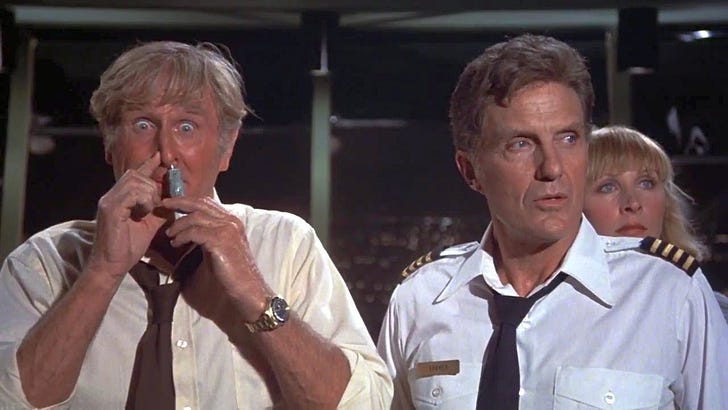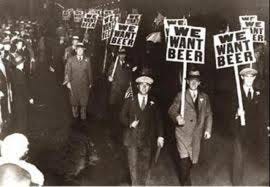For a laundry list of reasons, the 1980 movie Airplane was one of my favorites during my teenage years. You might say, “Surely you’re not serious!” But I am serious, and stop calling me Shirley. (That joke doesn’t work as well in print as it did the movie.)
One of the best running gags of the film, other than the flight crew of Roger, Victor and Clarence, was when the stress of the potential plane crash kept escalating, and the Lloyd Bridges character reacts by saying, “I guess I picked the wrong week to quit smoking,” and then he proceeds to light up a cigarette. He does the same again as the tensions rise, “I guess I picked the wrong week to stop drinking.” He then takes a swig on a flask. It continued to escalate with other addictions. Watch for yourself in the video below…
Regardless of whether this is your kind of humor, and I do hope you’ll tell me in the comments if it is, I have been thinking of this running gag when I consider all the immense amount of news that is coming out that has been disturbing to my friends and colleagues of various sorts. I don’t watch television news anymore, so most news comes to me as news that people tell me. I’m a word of mouth news guy now. On one level that makes me less alarmist and not caught up in the 24-hour news cycle, which I like a lot. On the other hand, when I do hear of newsworthy events they are more within the context of a real life human who is affected by these event, and that makes me more concerned than ever.
This all has me wondering, from time to time as I hear about all that is going on, if maybe it’s time to start drinking after all.
I didn’t “quit drinking” like the character in the Airplane movie. I never started. I am one of those strange people who have never once drank alcohol, ever. I took a vow in high school to not drink (long before I had a denominational membership or was ordained.) I’ve stuck with it ever since.
But some of the events of the world around me have me wondering if my streak of 50 years as a teetotaler is really worth keeping alive.
In the midst of this wondering, I came across some information from one of my favorite researchers named Ryan Burge. He shares the following:
So, the Southern Baptists don’t seem to talk about drinking alcohol as much as they used to (either pro or con). Now, perhaps my denomination is just behind the times, but there was some action on alcohol and membership in my denomination at the last few general conferences. (I am from the Wesleyan denomination.) But I have noticed that in general, there is less of a stigma associated with drinking in our culture than in decades past, and perhaps even more a focus on other issues has supplanted this subject matter. Perhaps some of the energy the alcohol debates required has been sucked up into all the other culture wars and political friction we hear about these days, ya know, the stuff that sometimes has me wondering if it’s time to start drinking.
I’ve mixed it up in the past on the subject of alcohol. In fact, when people have pushed me to engage on it, I remind them that I’m one of the few in my parochial circles that has even published about it. In a book called Ageless Faith my Dad and I discussed and argued through different issues in the church. One of those was a chapter called, “Alcohol.” Here’s what some of that dialog looked like:
DAVID: Doesn’t it seem like our denomination and others that don’t allow drinking alcohol are out of touch?
KEITH: Out of touch with whom? If you mean out of touch with the culture, yes. However, it is not out of touch with our past values and a longstanding stance of most of North American evangelicals.
DAVID: Many in my generation wonder what’s wrong with a member having a glass of wine with dinner or a casual drink while watching the Super Bowl. Doesn’t it just make our churches an intentionally strange misfit with the culture?
KEITH: It does. Being different than the culture is not a vice in our denomination. Separation from the culture has traditionally been a virtue in the holiness movement.
DAVID: I’m not sure this “virtue” should be considered such a badge of honor. Jesus and the disciples got a lot of flak from the Pharisees about breaking their religious taboos. I suppose that Jesus was different in action and values from the prevailing culture of the time. We should be different from the culture, but so many other ways of difference seem more important to my generation than picking alcohol.
KEITH: Alcohol is just one way. The current way we are different is opposing abortion. The majority of Americans are pro-choice, yet Wesleyans are almost all anti-abortion. We believe the culture is wrong on abortion, and thus we are happy to be different on this stance.
DAVID: Are you saying drinking a glass of wine is like killing a fetus?
KEITH: No, but the comparison helps you younger folk understand our stance on alcohol. The prohibition movement was similar to the anti-abortion movement: It was a vast movement to ban all alcohol from society, and it succeeded for thirteen years from 1920 to 1933. When we eventually lost the fight to completely ban alcohol from society (in 1933), the church’s fallback position was to ban alcohol for its own members. When this position was put into The Discipline1, there was absolutely unanimous support, just like today’s support for the anti-abortion position. Hardly a single person had any other position at the time. The anti-alcohol position was so unanimous that nobody even imagined any other position for most Protestants. This was not just Wesleyans; the Methodists and many other denominations took the exact same stance too. When prohibition was repealed by the twenty-first amendment, these denominations adopted total abstinence for their own members even though it was legal for the rest of the country. The United Methodist Church still “affirms our long-standing support of abstinence from alcohol as a faithful witness to God’s liberating and redeeming love for persons.”
DAVID: But things have changed, haven’t they?
KEITH: They have. The church has changed too….
In terms of change, our own denomination changed it requirements again on membership since that book was published in 2010. So a good bit of that argument is moot now. But I offer it as reference point on the subject of drinking. I certainly think that all Dad’s march through history about prohibition and otherwise is interesting. And he was right—we were just caught up into the broader Christian way of thinking about changing things in the culture that came from honest convictions that alcohol was a bad thing for everyone, so why not ban it?
But there’s three problems this brings up for me these days when I’m wondering if maybe it’s time to start drinking.
First Problem: It didn’t work.
The reality is that Prohibition didn’t work even though it experienced the greatest “victory” one might imagine. The prohibition types actually got the Eighteenth Amendment to the United States Constitution ratified at the beginning of 1919. Just a reminder here that doing this requires much more than just getting congress on board. It also requires three-fourths of the states (today that would be 38 of 50 states, but back then there were only 48 states) to also vote in favor of the amendment. I’m not sure 38 of 50 of our states today would agree to vote in favor of a statement saying the sky is blue.
But the victory was somewhat short lived, just over a decade later, in 1933, the Twenty-first Amendment came along, in which the very same process pretty much everyone agreed on the subject the other way (this Amendment functionally repealed the Eighteenth Amendment.) It is the only amendment we have that is just a straight up “do-over” on a previous amendment—saying: “Yeah, we got that one wrong.” I should point out here that not exactly everyone agreed. While almost every state voted unanimously in their legislatures to approve the Twenty-first Amendment, my own state of Indiana had the most nay-sayers. 83 of our representatives voted no. I can only find record of 3 other representatives in 37 other states that voted no. So I write this all at risk of the descendants of teetotaling Hoosiers breaking into my basement in search of a moonshine still (some of those descendants may in fact be in my denomination.) But it’s not just that it didn’t work. There’s another problem.
The Second Problem: It’s not the way to change things in the first place.
The real problem is that taking control through our government of this issue and legislating it had a major backlash effect. It is quite likely that prohibition set up drinking as a more socially acceptable and even honored place in U.S. culture. Because of the wholesale way the effort to legislate this morality was perceived, a massive backlash era was introduced and conservative Christians were roundly defeated. Again, this was a legislating of morality that my Dad rightly pointed out in the chapter I quoted above as nearly unanimous among conservative Christians at the time. The way to change things in regards to alcohol’s effect in society was likely more the approach of the original Methodists, which had the effect of changing actual lives through disciple-making and accountability. England was quite the mess when the Methodist revivals began, and many credit an entire reshaping of the social landscape of Britain because of them, including problematic alcohol consumption. [I’ll now add here the relevant and wise quote from Dave Horne in the comments after I posted this: “There is something fundamentally different with a theology that wants to force change through power and a faith that wants to transform through love.”]
The Third Problem: We’re making the same mistakes now.
But the biggest irritation for me is that we, meaning conservative Christians, have fooled ourselves into thinking that we can leverage power in the government to change things again—to have our own prohibition-like-success where the whole country is forced to align with our morality, and that it will somehow work this time. I am very skeptical that it will. Instead, I’m guessing that something close to the backlash we experienced post-prohibition is coming, where 14 years later there is near unanimous agreement that, “Yeah, we got that one wrong.” Are there some things that are a matter of life-and-death justice matters that I wish the government would have different laws for now, such as abortion? Yes. But do I think our modus operandi should be mobilizing the church for taking control of the governmental means of law-giving to establish all of our convictions as the law of the land? No.
So that’s my thinking these days as I wonder whether it’s time to start drinking. In the end I don’t think I’ll pick up the bottle. On a personal level, I have always wondered if I might go too far with drinking. I’ve sometimes said of my Dad that he wasn’t a big fan of moderation (those who know him the best know this). I have a similar problem that makes me worry about even starting drinking. And while I’ve been skeptical of my denominational membership commitments at times, I’ve also had a worry about young people and drinking, in particular. I know that when I was a college student and young adult, binge-drinking saw a steep rise in the states and became a more standard way to drink.2 In other countries someone might get drunk only one in ten times they drink—while in America, where so many like me are “not big fans of moderation,” up to half of all times people drink they become drunk.
What’s more, as alcohol consumption became more acceptable, I’ve seen many young adults get snared into thinking it is just a classy and forward-thinking “wine with dinner” lifestyle but then five years later come to the realization that they are drinking to cope, and hitting the bottle in the middle of the day with abandon. I’ve been encouraged to read many self-revealing essays, more often from women who were willing to share, where they talk about this sort of “soft-alcoholism” that was messing with their lives. Thankfully, many are escaping that way of life.
Upon further reflection, I don’t believe it’s time for me to start drinking. I already have a beard, a theology degree, and write regularly on Substack. So to be honest I can’t suddenly start ALSO drinking IPAs and wearing John Calvin t-shirts or people will start to think I’m an insufferable Theobro who visits The Gospel Coalition website every day over breakfast. And, more seriously, I also don’t want to be like those pastors who get sloshed because of their “freedom in Christ” and then start making passes at the younger women on staff at their church.
So no drinking for me, at least not yet. But if I ever start watching the news again I may find out that I definitely picked the wrong quadrennium to stop taking amphetamines.3







Great post! Leslie Nielsen fan here, BTW. Funny story. I had only seen the TV edited version of Airplane 2, so when my twin boys were about 12, we sat down to watch it together. Only it wasn't the TV edited version. Oops. We didn't make it through the opening scene. My sons have never forgotten it.
I totally agree with the underlying premise regarding the misguided attempts at prohibition, regardless of what our current favorite taboo may be. The Gospel changes hearts one at a time, and changed hearts change the culture, not the other way around.
Helpful.